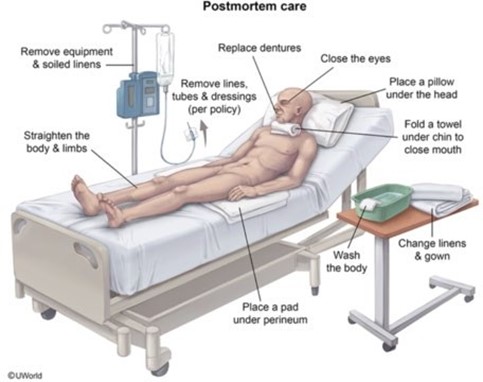A charge nurse in a long-term care facility reviews client outcomes when delegating tasks to assistive personnel (AP) with a newly licensed nurse. Which of the following statements should the charge nurse include in the teaching?
"The AP should document the client's outcome for a delegated task."
"The final step in delegation is evaluation of the outcomes."
"A delegated task does not require predictable outcomes."
"The nurse gives up accountability for client outcomes when care is delegated."
The Correct Answer is B
The charge nurse should include the statement "The final step in delegation is evaluation of the outcomes" in the teaching. This is because it is important for the nurse to evaluate the outcomes of delegated tasks to ensure that they have been completed correctly and that the client's needs have been met.
Option A is incorrect because it is not the AP's responsibility to document the client's outcome for a delegated task.
Option C is incorrect because a delegated task should have predictable outcomes.
Option D is incorrect because the nurse does not give up accountability for client outcomes when care is delegated. The nurse remains accountable for ensuring that the delegated task is completed correctly and that the client's needs are met.
Nursing Test Bank
Naxlex Comprehensive Predictor Exams
Related Questions
Correct Answer is D
Explanation
Assistive personnel (AP), also known as unlicensed assistive personnel (UAP), can perform tasks such as assisting with activities of daily living, hygiene, and nutrition, as well as those tasks that support professional nursing assessments ². Providing postmortem care for a client who has died [d] is a task that can be delegated to an AP.
The other options are not tasks that should be delegated to an AP. Educating a client on the use of a blood glucose monitor [a] involves patient education, which is typically the responsibility of a licensed nurse.
Interpreting a client's vital signs [b] involves assessing the client's health status, which is also typically the responsibility of a licensed nurse. Performing a central line dressing change for a client [c] is a complex task that requires specialized knowledge and skills.

Correct Answer is B
Explanation
The charge nurse should include the statement "The final step in delegation is evaluation of the outcomes" in the teaching. This is because it is important for the nurse to evaluate the outcomes of delegated tasks to ensure that they have been completed correctly and that the client's needs have been met.
Option A is incorrect because it is not the AP's responsibility to document the client's outcome for a delegated task.
Option C is incorrect because a delegated task should have predictable outcomes.
Option D is incorrect because the nurse does not give up accountability for client outcomes when care is delegated. The nurse remains accountable for ensuring that the delegated task is completed correctly and that the client's needs are met.
Whether you are a student looking to ace your exams or a practicing nurse seeking to enhance your expertise , our nursing education contents will empower you with the confidence and competence to make a difference in the lives of patients and become a respected leader in the healthcare field.
Visit Naxlex, invest in your future and unlock endless possibilities with our unparalleled nursing education contents today
Report Wrong Answer on the Current Question
Do you disagree with the answer? If yes, what is your expected answer? Explain.
Kindly be descriptive with the issue you are facing.
